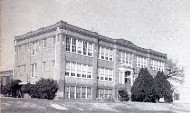Milam County Historical Commission
Milam County, Texas
Milam County, Texas






All articles from the Temple Daily Telegram are published with the permission of the
Temple Daily Telegram.
All credit for this article goes to
Jeanne Williams and the Temple Daily Telegram
Photos by Shirley Williams -
Temple Daily Telegram photographer
Temple Daily Telegram.
All credit for this article goes to
Jeanne Williams and the Temple Daily Telegram
Photos by Shirley Williams -
Temple Daily Telegram photographer
Canady family traces history to slavery
by Jeanne Williams
Temple Daily Telegram - October 9, 2009
CAMERON - In 1929, Little Jim Canady's family could not afford the luxury of a
conventional grave marker, but his son, Ira Canady Sr., took measures to ensure this
burial site would never be lost.
Though many impoverished survivors traditionally employed large rocks to designate a
burial site, Ira Canady Sr. at age 29, manifested his family's ingenious and
pragmatic traits by choosing a long iron pole topped with a ring that he salvaged
from an old farm implement to identify the grave in rural Little Rocky Cemetery,
northeast of Cameron off FM 2095.
Ira Canady Sr. carried on the family tradition of longevity dying in 2000 at age 100,
four months before he would have celebrated his 101st birthday. During his long life,
as he dispensed wisdom and guidance to his 13 offspring, he also told them of the day
he pounded, hammered and coaxed most of the iron pole into the ground as permanent
marker for his father's grave.
In the 1970s, Ira and a brother bought grave markers for the burial sites of paternal
grandparents Little Jim and Kattie Youngs Canady, as well as great-grandparents, Big
Jim and Ella Canady, both of whom were born into slavery. Canady kinfolks are buried
all around Little Rocky Cemetery.
The iron ring is still stuck in the ground at Little Jim Canady's gravesite, and Ira
Canady Sr.'s children still are amazed at how their father managed to work into the
ground a sturdy iron pole. No one today wants to remove the pipe, even if they could.
Thirteen of the 38 burial sites in Little Rocky Cemetery belonged to slaves, said
R.L. Canady, 66, of Dallas. He has researched Canady family history for a decade, and
is now preparing to delve into the formidable task of sorting through slave
schedules, tax records and slave ship rosters to further backtrack his forebears'
path from America to Africa.
Ten years ago, genealogical research meant tediously reading through miles of reeled
microfilmed records, and studying volumes from libraries. Today's researcher, says
Canady, has the benefit of technology. R.L. Canady is the chief family genealogist,
though he is assisted by siblings Ira Canady Jr., 77 of Cameron and Hattie Canady
Steward of Temple.
To date, R.L. Canady has traced the family to 1819 and is planning to enroll in
classes that teach techniques for researching slave families back to Africa.
"It is a good thing longevity was on our families' sides," R.L. Canady said. "Daddy
lived 100 years, so he almost took us back into slavery. Senior genealogists look at
what I have gotten through research and they say we have a good chance in finding
where you are from, because of the periods our family lived."
Mrs. Steward recalled listening to her Dad's stories. "He would take you way back in
to time and tell you all the stories that he knew."
Researching O.J. Thomas High School for a Texas Historical Marker, Mrs. Steward
acquired information on the history of the Little Rocky community, where education
for Milam County's blacks began through developments made by the Freedmen's Bureau in
1865.
The Canady family had heard stories of Little Rocky, and their father could easily
navigate to the family plot where the iron ring protruded from the ground, Mrs.
Steward said. Ira Canady Sr. and his brother Jasper Canady pooled money and bought
tombstones for the four graves.
"They are old graves with new tombstones," Mrs. Steward said.
Little Rocky Cemetery is the only tangible evidence of a 19th-century black community
that also included a church. Members of the Canady clan can easily point out where
the church and the school once stood along the curvilinear County Road 244.
Ira Canady Jr., whose Christian name has been bestowed up the line to an Ira Canady
IV, remembers when he accompanied his father to Little Rocky Cemetery to visit family
plots. Not only has Ira Canady Sr.'s knowledge of names, dates and sites from family
in the 19th century been invaluable to his children's research, but a bonus has been
Ira Canady Jr.'s awareness of county roads, Milam County black history, farmers,
ranchers, land owners, prior owners and tenants of rural houses throughout the
county.
Recent trips to the Canady family plot in Little Rocky Cemetery have been emotional
for the siblings. Cemetery records omitted Ella Canady's gravesite, but R.L. Canady
found reference to the graveyard in death certificates, although family stories and
genealogical logic already had placed her grave beside her husband's.
Visiting the gravesites of the people he had been researching on paper "changed his
outlook," R.L. Canady said.
Ira Canady Jr. remembers his father making frequent trips to the cemetery in the
1970s, but return visits with his brother and sister in recent weeks have been
emotional. The family was saddened by the fact that their family cemetery and the
resting site of former slaves have been neglected.
The cemetery has no sign, and aside from tombstones hidden among trees and
underbrush, could be another insignificant stretch of Milam County wilderness. Ira
Canady Jr. has strung red plastic ribbons through the cemetery to various sites of
interest to guide the family to various gravesites.
Though some graves have traditional engraved markers, such as Woodmen of the World
monuments, many are still designed with large rocks.
"This cemetery held the graves of former slaves, their children and persons born in
slavery with the exception of one person who is descendent of one of the earliest
people born, 1821, a slave and Canady family relative," R.L. Canady said. Hence, the
newest grave was dug in 1999 for a man who wanted his resting place to be with his
ancestors.
The Little Rocky Cemetery Association was established this year, and Nov. 10 has been
designated as the first cleanup day.
"Members have committed to pledges to give honor and respect to those buried there,
those who cleared the way for hope for their people," R.L. Canady said. "Thus, with
commitment from these members a pledge to give back to those who gave so much and
received so little may rest in peace and dignity in a proper burial ground, the
Little Rocky Cemetery of Milam County."
The first celebration for descendants of former slaves buried at Little Rocky
Cemetery is tentatively scheduled for June 19, 2010, a date significant as
Juneteenth, the day Texas slaves learned they had been freed.
Shirley Williams/Telegram
Siblings R.L. Canady, Hattie Canady Steward and Ira Canady Jr. are joined by cousins Theresa Dawson and Renola Osband for a moment of family reverence at their grandmotherís gravesite.
.
Siblings R.L. Canady, Hattie Canady Steward and Ira Canady Jr. are joined by cousins Theresa Dawson and Renola Osband for a moment of family reverence at their grandmotherís gravesite.
.
